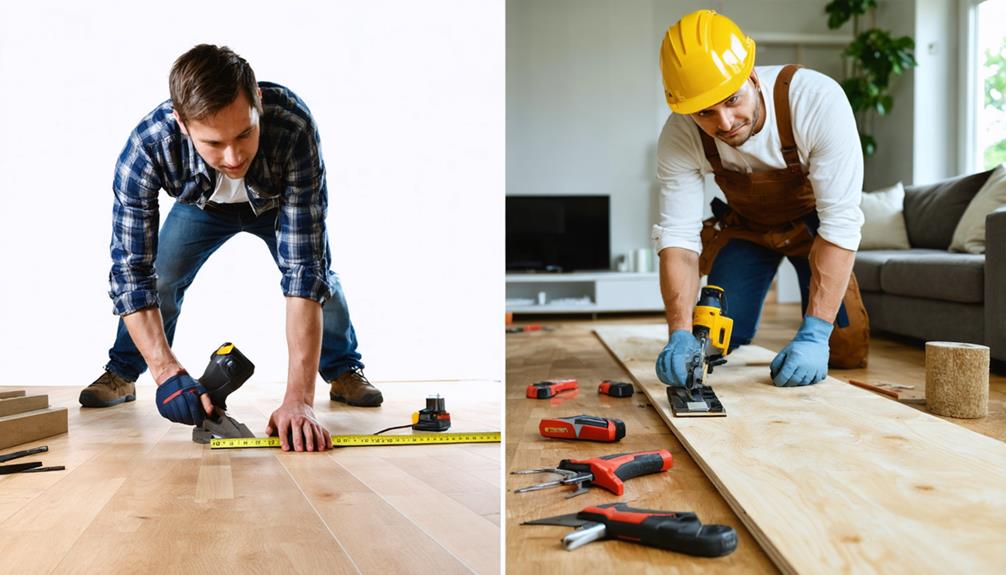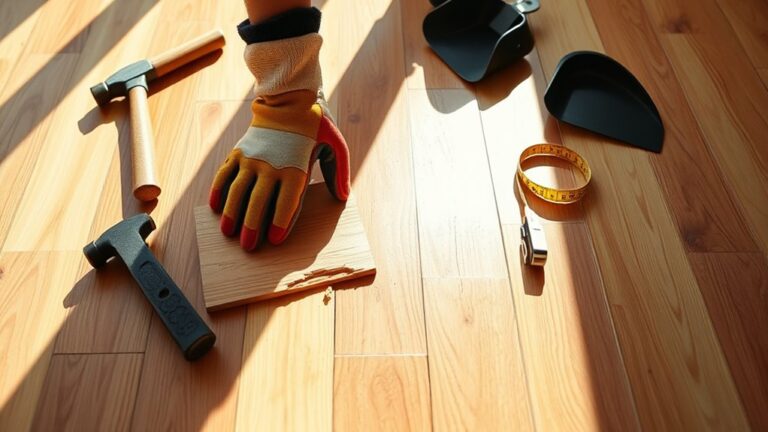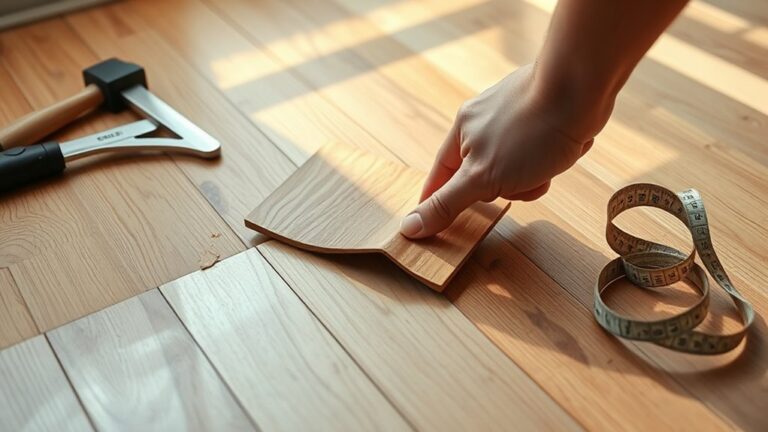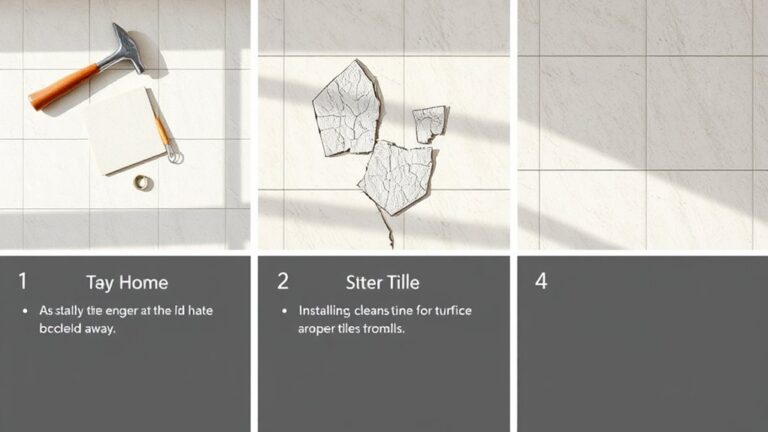When choosing between DIY and professional floor installation, consider the pros and cons carefully. DIY can save you money and give you creative control, but it often requires significant time and can lead to costly mistakes. You'll develop valuable skills, but without experience, you might struggle with measurement errors and physical demands. On the other hand, professionals bring expertise, speed, and warranties that protect your investment, although their services can inflate your budget. Weighing these factors will guide your decision, and exploring more insights can help clarify your next steps.
Overview of DIY Flooring Installation
When it comes to flooring installation, many homeowners find themselves weighing the option of DIY versus hiring a professional. DIY flooring installation can be an exciting venture that not only offers significant cost savings but also brings a sense of personal achievement. By cutting out labor costs, you can channel more of your budget into high-quality materials, giving your space the upgrade it deserves.
One of the biggest appeals of taking on a DIY project is the flexibility it provides. You can work at your own pace, adjusting your schedule as life demands. This freedom allows you to enjoy the process rather than feel rushed. Plus, who doesn't appreciate the satisfaction of completing a project independently? You're not just changing your floor; you're enhancing your connection to your home.
However, it's crucial to take into account that DIY flooring installation can be time-consuming. It's not just about the materials; you may also need to purchase or rent specialized tools. If you don't account for these expenses upfront, they can quickly add to your overall costs. That said, engaging in this type of project can also be an opportunity to learn new skills, which can be invaluable for future home improvement endeavors.
Advantages of DIY Installation
Initiating a DIY flooring installation can be a game-changer for homeowners looking to save money and personalize their space. By taking on this project yourself, you can eliminate the labor costs that typically range from $3 to $8 per square foot, making it a financially savvy choice. Not only does this save you money, but it also gives you complete control over your material selection and design choices, allowing you to customize your flooring to perfectly reflect your personal style.
The hands-on nature of a DIY project can lead to a rewarding sense of accomplishment and personal satisfaction. There's something incredibly fulfilling about seeing the results of your hard work, knowing you played a direct role in transforming your home. Plus, with DIY installation, you enjoy the flexibility of scheduling. You can work at your own pace, fitting the project into your availability without the pressure of a professional timeline.
Engaging in a DIY flooring project also serves as a valuable learning experience. As you navigate the process, you'll equip yourself with new skills and techniques that can be applied to future home improvement tasks. This newfound knowledge fosters a sense of independence and confidence, empowering you to tackle more projects down the line.
In essence, choosing DIY flooring installation not only saves you money but also enhances your living space while providing personal satisfaction and valuable skills.
Challenges of DIY Flooring Projects
While the benefits of DIY flooring projects can be enticing, it's important to contemplate the challenges that often accompany them. First off, DIY flooring installation can be incredibly time-consuming. You might start with a plan for a weekend project, only to find that it stretches into weeks or even months due to unforeseen complications and a lack of experience.
Measurement errors are another hurdle. It's easy to miscalculate your space, leading to wasted materials and unexpected costs that can wipe out any initial budget savings. Plus, the physical demands of flooring installation are no joke. If you're not used to heavy lifting and prolonged labor, you might end up feeling fatigued or even injuring yourself.
Without the guidance of professional installers, the risk of making mistakes increases considerably. Uneven flooring or improper installation techniques can compromise both the quality and durability of your new floor. And let's not forget about the tools. DIYers often lack the specialized equipment that pros have, which can lead to damaging materials during installation. This, in turn, may result in costly repairs or replacements—expenses that could've been avoided had you hired a professional from the get-go.
Benefits of Professional Installation
When you opt for professional floor installation, you're tapping into the expertise of trained installers who guarantee a high-quality finish. Not only do they bring valuable knowledge to the table, but many also offer warranties that protect your investment for the long haul. This combination of skill and security can save you time and stress, making it a smart choice for your home.
Expertise and Quality Assurance
How can you guarantee the best results for your flooring project? Choosing professional flooring installation is a surefire way to achieve that quality assurance you're seeking. With their expertise, pros bring a wealth of knowledge about various materials and techniques, guaranteeing a flawless finish that minimizes errors. Here are three key benefits of hiring professionals:
- Specialized Tools: Professionals use advanced tools that guarantee proper leveling and security, resulting in a durable and visually appealing floor.
- Efficient Workflow: Their experience allows them to complete large areas—like 1,000 sq. ft.—in just 2-4 days, saving you time and hassle.
- Troubleshooting Skills: Experts can quickly address installation issues, especially with complex flooring patterns, guaranteeing everything's installed correctly.
Warranties and Long-Term Value
Investing in professional floor installation can greatly enhance your home's long-term value and peace of mind. One significant benefit of hiring experts is the warranties they offer. Many professional flooring installers provide warranties that cover installation-related issues, securing your investment and protecting you from unexpected repair costs. These warranties often last several years, meaning any defects in workmanship or materials can be addressed at no extra expense.
Moreover, professional installation typically meets manufacturer warranty requirements. This adherence is essential because improper DIY installation can void those warranties, leaving you vulnerable if issues arise. By choosing professional installation, you guarantee your flooring maintains its value and performance over time.
The long-term value of this decision goes beyond just warranties; it includes the assurance of quality workmanship. With experts handling the job, you reduce the likelihood of costly repairs or replacements down the line. Ultimately, investing in professional installation provides you with not just a beautiful floor but also the confidence that your investment is protected for years to come. So, when weighing your options, consider how warranties and long-term value can make a difference in your home.
Drawbacks of Professional Flooring Services
While professional flooring services offer expertise, they often come with higher overall costs that can strain your budget. You might also face scheduling delays that push back your project timeline, leaving you waiting longer than expected. Plus, hiring out the work means you have limited control over the process, which can lead to dissatisfaction with the final results.
Higher Overall Costs
When considering professional flooring installation, homeowners often face a significant increase in overall costs compared to DIY projects. While the expertise of professional flooring companies provides a polished result, the investment can stretch your budget thin. Here are a few factors contributing to higher overall costs:
- Labor Fees: Professional services typically range from $3 to $8 per square foot, which can quickly add up based on your project's size.
- Additional Charges: You might incur extra fees for moving furniture or debris removal, further escalating your expenses.
- Unexpected Issues: If complications arise during the installation process, costs can exceed initial estimates, especially if warranties or guarantees are factored in.
While hiring professionals can offer efficiency and a seamless finish, it's essential to weigh these higher overall costs against your budget. You may appreciate the freedom that comes with DIY projects where you only pay for materials. Ultimately, understanding the financial implications of professional flooring services enables you to make informed decisions that align with your goals and financial situation.
Scheduling Delays
Scheduling delays can be one of the most frustrating aspects of hiring professional flooring services. When you're excited to transform your space, waiting weeks or even months for professional installers to become available can feel like an eternity. Many contractors juggle busy schedules, which can push your project start date back considerably, disrupting your daily routine in the process.
Additionally, communication gaps between you and your contractor can further complicate matters. If expectations aren't clearly established from the start, misunderstandings about timelines can arise, leaving you in the dark about your project's progress. Late arrivals or unexpected changes to the contractor's schedule can also lead to more delays, adding to your frustration.
While professional installation has its perks, the uncertainty of scheduling delays can be a major drawback. You may find yourself longing for the freedom to set your own timeline, which DIY installation can offer. If you're prepared to navigate the waiting game and potential miscommunications, hiring professionals might still be the right choice for you. However, it's crucial to weigh these scheduling concerns against the benefits before making your final decision.
Limited Control Over Process
Many homeowners discover that hiring professional flooring services comes with a significant trade-off: limited control over the entire process. Once you engage professional installers, you might find that key decisions about design choices and installation methods are largely out of your hands. This can lead to a feeling of disconnection from your home improvement project.
Here are three specific ways this limited control can impact you:
- Design Decisions: Professional installers often make design choices based on their expertise, which can sideline your personal vision.
- Communication Gaps: If you don't clearly express your preferences, the end result might not match your expectations, leading to dissatisfaction.
- Unexpected Changes: Installers may encounter unforeseen issues that require alterations to the original plan, leaving you feeling out of the loop.
Moreover, reliance on professionals can diminish your personal investment in the project. You might experience delays due to scheduling conflicts, further reducing your control over when the installation takes place. While professional services can offer expertise, understanding these limitations can help you weigh your options more effectively.
Key Considerations for Decision Making
Deciding between DIY and professional floor installation really boils down to a few key considerations that can make or break your project. First, think about your budget. A DIY project might seem cheaper upfront, but don't forget to factor in potential material waste and mistakes. On the other hand, hiring a professional often comes with a clearer price range, typically from $3 to $8 per square foot, and may include warranties for peace of mind.
Next, assess your skill level. If you're comfortable with tools and have experience, you might tackle simpler installations. However, complex materials or patterns often require specialized skills that inexperienced DIYers may lack.
Another consideration is your time availability. DIY installations can stretch over weeks, while professionals usually complete their work in 2-4 days. Balancing your time against the project's complexity is essential.
Lastly, think long-term. Weigh the risk of mistakes in a DIY project against the security of professional warranties and guaranteed workmanship. Here's a quick table to summarize these points:
| Consideration | DIY Approach |
|---|---|
| Budget | Potentially lower, but risky |
| Skill Level | Requires self-assessment |
| Time Availability | Can be time-consuming |
| Long-Term Value | Risk of mistakes |
Ultimately, making an informed choice means considering your unique situation, which will lead you to the satisfaction of a job well done, whether you do it yourself or hire a pro.
Comparing Costs: DIY Vs Professional
When it comes to flooring installation, understanding the costs involved can make a significant difference in your decision. You may be tempted to take the DIY route for cost savings, but it is vital to evaluate the pros and cons.
Here's a quick breakdown of costs associated with both options:
- DIY Flooring Installation: While you can save upwards of 50% on labor costs, you might encounter unexpected expenses. Measurement errors can lead to material waste, sometimes up to 20%, which can eat into your initial savings.
- Professional Installation: Typically ranging from $3 to $8 per square foot, this option includes labor and often comes with warranties and guarantees. It might seem pricier at first, but hiring a pro can expedite the process—installing large areas (1,000 sq. ft.) in just 2-4 days compared to weeks for a DIY project.
- Long-term Costs: While DIY may reduce your upfront costs, mistakes could require hiring professionals later, leading to increased overall expenses. It is important to take into account not just the initial investment but also potential long-term financial impacts.
Choosing the Right Flooring Option
After weighing the costs of DIY versus professional installation, the next step is selecting the right flooring option for your space. Start by considering the durability and maintenance of various materials. For instance, luxury vinyl is a fantastic choice for high-traffic areas like kitchens and bathrooms due to its water resistance and ease of cleaning.
Next, assess the complexity of your flooring installation. If you're eyeing intricate designs or specialized materials, you might need the expertise of professional installers to guarantee a quality finish. This can save you from costly mistakes down the line.
Your budget is another critical factor. While DIY flooring installation can save you on labor costs, unexpected expenses may arise from material waste or errors, potentially negating those savings. If you're skilled and comfortable tackling simpler flooring types like laminate or vinyl, go for it! However, if you're considering hardwood or intricate tile patterns, expert help could be your best bet.
Lastly, think about the long-term value. Weigh the upfront costs against potential resale value. High-quality flooring installed by professionals often comes with warranties, providing peace of mind for homeowners. Ultimately, the right choice balances your budget, skill level, and design preferences, guaranteeing you enjoy a beautiful and functional space for years to come.
Frequently Asked Questions
Should I Install Flooring Myself or Hire Someone?
When deciding whether to install flooring yourself or hire someone, consider your installation skills and the time commitment involved. If you're confident in your abilities and have the time to dedicate, DIY could be rewarding. However, if you're unsure about material selection or the complexities of the process, hiring a professional might save you from potential headaches. Ultimately, it's about balancing your desire for freedom with the quality and efficiency you want.
Is It Worth It to Install Flooring Yourself?
Installing flooring yourself can be worth it if you're ready for the installation challenges ahead. A cost analysis shows potential savings, but don't forget the skill requirements; you'll need to measure accurately and handle tools properly. While you might enjoy the freedom of a DIY project, be prepared for the time commitment and possible mistakes. If you're confident in your abilities and willing to learn, it could be a rewarding experience.
Is It Cheaper to Install Hardwood Floors Yourself?
Isn't it tempting to save on hardwood installation costs by doing it yourself? You might think you can cut costs, but don't forget the DIY tools needed and the range of flooring material options that can add up quickly. If you miscalculate, you could waste materials, negating any savings. While you'll enjoy the freedom of DIY, consider if that's worth the risk of costly mistakes and repairs down the line.
Can I Replace My Flooring Myself?
Yes, you can replace your flooring yourself! It's a rewarding challenge that gives you freedom over your space. Start by choosing flooring types like laminate or luxury vinyl, which are easier for beginners. You'll need tools like a saw, measuring tape, and a level. Familiarize yourself with installation techniques, like clicking and gluing, to guarantee a smooth process. Just remember to measure accurately to avoid waste and keep your project on track!




